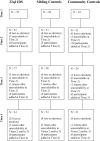Predicting Cognition and Psychosis in Young Adults With 22q11.2 Deletion Syndrome
- PMID: 27798222
- PMCID: PMC5472116
- DOI: 10.1093/schbul/sbw135
Predicting Cognition and Psychosis in Young Adults With 22q11.2 Deletion Syndrome
Abstract
Objective: To assess the extent to which the trajectories of intellectual, academic achievement, executive functioning, attention, working memory, and emotion recognition tests will be predictive of psychosis in young adults with 22q11.2 deletion syndrome (22q11DS).
Methods: Eighty-two participants with 22q11DS were assessed for psychiatric disorders and neuropsychological functioning with validated instruments. Siblings and community controls were employed as comparison groups.
Results: Individuals with 22q11DS differed significantly from siblings and controls in longitudinal trajectories of visual and auditory working memory as well as academic achievement. Longitudinal trajectories of cognitive set shifting, reading decoding, and emotion recognition predicted the presence of positive symptoms of psychosis in early adulthood. Cognitive set shifting improved at a slower rate for individuals with 22q11DS + psychosis than those without psychosis. Emotion recognition increased steadily in individuals without psychosis, whereas for those with psychosis, scores increased until approximately 15 years of age, at which point they began to decrease rapidly. A similar, but more subtle effect, was seen for reading decoding.
Conclusions: Our data are the first to go beyond IQ assessments in assessing longitudinal neuropsychological outcomes and risk for psychosis in 22q11DS. Individuals with 22q11DS who developed psychotic symptoms improved less appreciably and continued to demonstrate difficulties with cognitive flexibility relative to individuals with 22q11DS who did not have psychotic symptoms. Individuals with 22q11DS who developed psychosis had weaker reading skills in childhood and, after an initial improvement into adolescence, these individuals with psychosis had a decline in reading skills. In 22q11DS, cognitive deficits are both (a) traits that are preexisting and raise the risk for psychosis and (b) associated with the onset of psychotic symptoms. Future research should consider the extent to which cognitive set shifting and reading decoding are related to the Verbal IQ declines observed in the 22q11DS population.
Keywords: 22q11.2 deletion syndrome (22q11DS); developmental; longitudinal; neuropsychology; psychosis.
© The Author 2016. Published by Oxford University Press on behalf of the Maryland Psychiatric Research Center. All rights reserved. For permissions, please email: journals.permissions@oup.com.
Figures
References
-
- Grati FR, Molina Gomes D, Ferreira JC, et al. Prevalence of recurrent pathogenic microdeletions and microduplications in over 9500 pregnancies. Prenat Diagn. 2015;35:801–809. - PubMed
-
- Schneider M, Debbané M, Bassett AS, et al. ; International Consortium on Brain and Behavior in 22q11.2 Deletion Syndrome. Psychiatric disorders from childhood to adulthood in 22q11.2 deletion syndrome: results from the International Consortium on Brain and Behavior in 22q11.2 Deletion Syndrome. Am J Psychiatry. 2014;171:627–639–639. - PMC - PubMed
Publication types
MeSH terms
Grants and funding
LinkOut - more resources
Full Text Sources
Other Literature Sources
Medical



